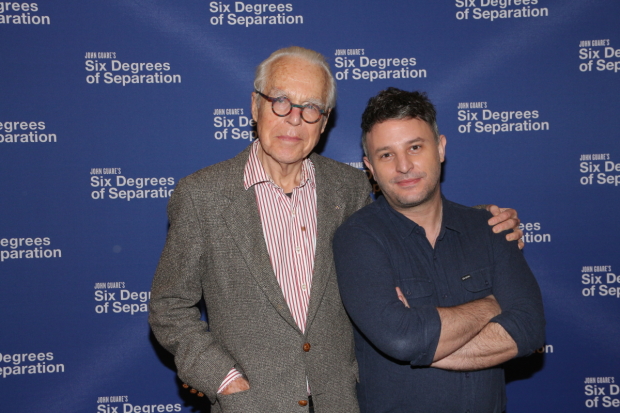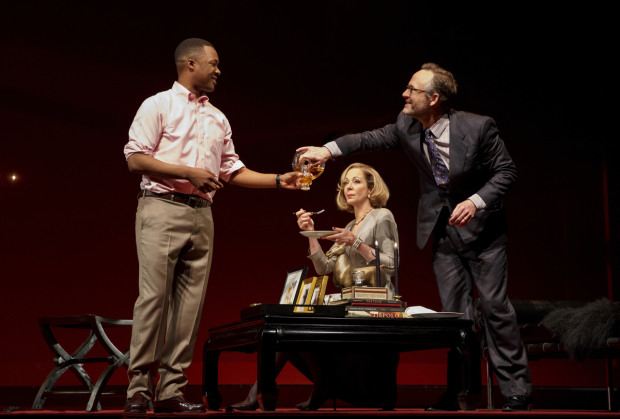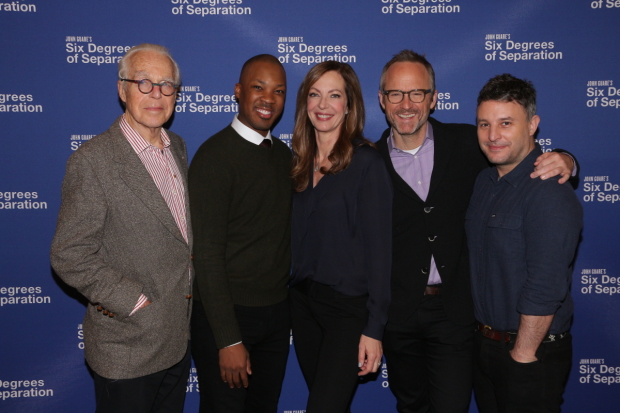John Guare and Trip Cullman's 20 Years of Friendship and Six Degrees of Separation
The pair discuss how a Broadway collaboration grew out of an undergrad casting call.
John Guare's acclaimed play Six Degrees of Separation is enjoying its first Broadway revival with an all-star cast featuring Allison Janney, John Benjamin Hickey, and Corey Hawkins. The production is helmed by newcomer Trip Cullman, whose only other Broadway directing credit is this season's Significant Other. But to Guare, Cullman isn't an unknown commodity any more than his starry cast. In fact, the two have a relationship that extends back two decades.
"I really kind of admired Trip and all the work that he's done," said Guare on following the young director's career. "He always kept making more of himself. I mean he has about 300 plays a year." During a recent conversation, the pair recounted their first encounter, their mutual admiration, and the pleasures of collaboration.

(© David Gordon)
This interview has been condensed and edited for clarity.
How did you meet?
John: Twenty years ago Yale Rep was doing a play of mine, Landscape of the Body, with Laura Linney, and it needed some murderous teens. That's how I met Trip. He came to the audition and we said, "Get that boy." He was an undergraduate at Yale and then he went to the drama school where I was teaching.
Then he directed a wonderful production of Six Degrees of Separation at the Old Globe a number of years ago that was absolutely beautiful. So I was very happy when this production came up, and Stuart Thompson, our terrific producer, said, "I don't know if you know, but I've had my eye on this young director for a long time, and I'd love to use him, Trip Cullman." And it was just my thinking too because if we were going to do the play I wanted a new look at it but I wanted an eye I could trust.
John, what caught your eye about Trip's work?
John: He has a gift that so few directors have: a narrative sense. It is the most powerful thing for a director to have. You see so many plays where the scenes are absolutely beautiful but they don't add up to anything.
Trip: Part of what's extraordinary about John's work is the great, breakneck, breathless speed of the narrative. Part of the absolute joy and delight of watching a play written by John Guare is that you actually don't know where the play is going at all. Each scene is a little play in and of itself. The hard part is then to connect all of them together to make one overarching narrative and to make sure that all the extraordinary tonal shifts in the play cohere into one narrative. That is truly a delicious challenge.
I think it's the mark of a great piece of writing, that it's not an issue play, it's not a topic play, it can't be reduced to a play about family or a single relationship. It's just massive and it contains multitudes.

(© Joan Marcus)
Trip, what has it meant to you to have John there as a kind of through-line of your career?
Trip: Every day when I come to work on this project, I pinch myself because my parents took me to the theater like some parents take their children to church and one of the very first things that I saw that sort of imprinted upon me in a way that made me think "Oh, this is what I want to do with the rest of my life" was the original production of Six Degrees of Separation. I mean this is the absolute highlight of my career, and I'm getting choked up even thinking about it. Over the years, to have John's support and his encouragement – he's also such an extraordinary advocate for young writers, too. Having directed so many new plays, he's always there. He always comes to see every young writer's work.
John, why is it important to you to support the next generation of young writers?
John: To make sure there is one. I've had students at Yale, my main task with them in drama school was not helping them with their writing, but showing them how valuable they were. Because they're ready to give it up and go into teaching or television. It's making people who have a gift for theater writing that it's possible to have a life in the theater.
What is your working relationship like?
Trip: One of the primary pleasures of this entire experience has been watching John look at this play as if he'd never seen it before. So all these new ideas are coming out, and it's such a fun dialectic between the two of us because it does feel like we're continually in a kind of "what if?"
I have done a revival before with the playwright around and sometimes that experience is disheartening because the playwright has such a fond connection to the original production that he or she forces the director into making all these choices for the current production that mirror the old production. It's been not at all the case with this. There are choices that we've made in this production that have come from a kind of in the moment observation of what's happening in the room. It's like the best drug ever. It truly feels like that.
John: I had a great experience with the first production, but like an old love, that was then. You just can't force your new partner to behave exactly the same. The old production can't loom over you to the destruction of the current relationship. The play belongs to the moment and it has to live intensely in this moment.

(© David Gordon)












